 By Nick van Terheyden aka Dr Nick, Principal, ECG Management Consulting
By Nick van Terheyden aka Dr Nick, Principal, ECG Management Consulting
Twitter: @drnic1
Host of Healthcare Upside Down – #HCupsidedown
Everyone remembers the day they receive their cancer diagnosis. Everything changes from that moment on.
Patients often encounter a sinking feeling as they await the results of their screening, interpreting any delay as an indication of a problem. Many then breathe a sigh of relief when they are given the all-clear.
But for others, that doesn’t occur. The mood turns somber as the news is broken, and patients sit in disbelief, trying to process the information while their emotions run amok.
Patients embarking on a cancer journey need not just support, but empathy—from their family, friends, and loved ones, and from their care providers as well. But at a time when healthcare is becoming increasingly digitized, are we at risk of losing the human dimension of care?
Episode NOW on Demand
Adam Pellegrini, co-founder and CEO of Jasper Health, believes technology and empathy don’t have to be mutually exclusive. “I never took this role thinking that Jasper was a virtual care company,” Adam says. “I took it thinking that Jasper is an empathetic engine to deliver psychosocial support. Our goal is to be able to deliver empathy at scale.”
Jasper Health bills itself as a cancer care concierge service that aims to deliver empathetic care through personalized, insights-driven guidance. Members receive psychosocial support through a smart personalized planner and an app that connects them with caregivers, providers, and health plan care teams. The goal is to improve the cancer care experience: less stress and anxiety, better medication adherence, improved quality of life, and reduced costs.
On this episode, Adam describes the care platform in detail, talks about the road that led him to Jasper, and shares several compelling stories from patients who’ve used from the service. Here’s a sneak peek.
About Jasper Health
“It’s a digital oncology platform. We have almost 13,000 members; we choose to consider our patients “members,” because cancer doesn’t define them. We provide psychosocial support—think about diet, fitness, nutrition, an ear to talk to, as well as medication adherence and other psychosocial elements that are sometimes missing in the cancer journey. The layer of empathy is where I think we’re unique, because that’s where we have coaches, dieticians, nutritionists. That’s where we’re focusing our human care advocates.”
A B2B Service with a Free Component
“Initially, the idea was more of a direct-to-consumer model. We changed to focus on creating a B2B healthcare platform for oncology. But we kept that consumer channel open, simply because we’re helping thousands of members every day.
“And the reality is that [the free resource] does align to the B2B strategy; I actually consider it a C2B2B strategy. Because I can connect members to our existing partners. And if the patient wants to connect to their local hospital, their oncologist, or their health plan to unlock new resources and services, they can do that. And to the B2B partners, that’s a huge value add. So it aligns to our business model, even if it doesn’t generate revenue.”
The Need for Human Connection
“The stories are so powerful. One member, through a free Android phone she got from a social service program, connected with our coach and shared that she was homeless, living in a car, had late-stage breast cancer, had no money whatsoever, and had to take street drugs for pain. She went to the ER, and they thought she was looking for drugs, so they wouldn’t see her.
“So our coach worked with her throughout this whole episode. And it turns out she was she was eligible for Medicaid and didn’t even know what Medicaid was. So we connected her to the local Medicaid program, and she can actually get resources and services. That didn’t take sophisticated clinical technology—that took talking and listening, and then actually trying to go out there and solve the problems.”
About the Show
The US spends more on healthcare per capita than any other country on the planet. So why don’t we have superior outcomes? Why haven’t the principles of capitalism prevailed? And why do American consumers have so much trouble accessing and paying for healthcare? Dive into these and other issues on Healthcare Upside/Down with ECG principal Dr. Nick van Terheyden and guest panelists as they discuss the upsides and downsides of healthcare in the US, and how to make the system work for everyone.
This article was originally published on the ECG Management Consulting blog and is republished here with permission.
